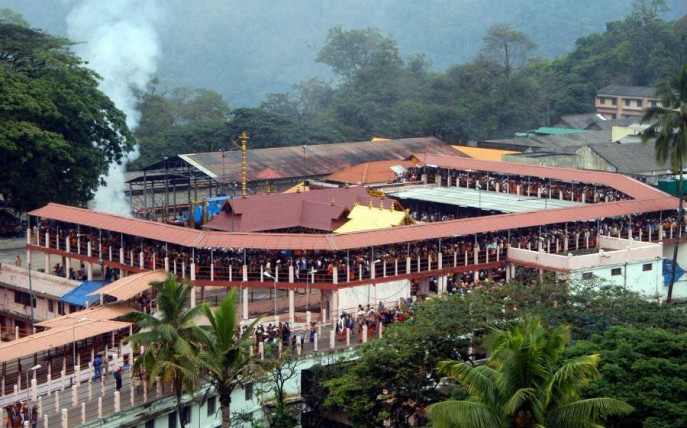A machine to scan purity of women at Sabarimala? Then why not one for men too?
The age-old custom of Sabarimala temple prohibits women in the menstrual age group (usually between 10 and 50) from entering the temple on the premise that menstruating women would make the sacred temple precincts unclean and impure.
The surreptitious entry of women within this age group has often led to confrontations with the security staff and the temple volunteers. The entry of some high-prifile women into the Sabarimala temple had raised a storm in the past.
In 2006, Girija Lokesh, popular Kannada film and TV actress, admitted that she violated Sabarimala regulations by entering the sanctum sanctorum of the temple in 1987. In December 2010, Kerala police had chargesheeted Kannada actress Jayamala who had claimed that she had entered the Sabarimala temple and touched the idol of Ayyappa.

In spite of the close surveillance maintained by the security agencies, such incidents do happen every now and then and the authorities are at a loss to find an effective solution to the issue.
Prayar Gopalakrishnan, the new President of the Travancore Devaswom Board which manages the Sabarimala temple, is now in the eye of a storm over his tongue-in-cheek remark that the Devaswom should deploy a machine that can scan and judge the purity of women.
“These days there are machines that can scan bodies and check for weapons. So why not develop a machine to scan if it is the ‘right time’ (not menstruating) for a woman to enter the temple,” asks the Devaswom chief during his interaction with media persons.
His remarks at the start of the new pilgrim season have set the cat among the pigeons, with many women’s rights activists lambasting his remarks. They argue that if a machine is used to determine the purity of women, there could also be a machine that scans and finds out whether men have led a celibate, teetotaler, vegetarian life for 41 days which is mandatory for the pilgrims entering the temple.

Some question the very perception that menstruating women are impure and want the Sabarimala temple to abandon the archaic custom that militates against gender equality. Worship and devotion has nothing to do with your biological phenomenon. There are no such ban on entry of women in other Ayyappan temples in the country, they point out.
But the devout sections argue that Ayyappan is a Bramhachari (celibate) and that is the reason why the entry of the women in the menstrual age group is prohibited in Sabarimala. Since this custom is part of the inalienable Hindu religious belief, it can’t be tampered with, they argue.
Sabarimala temple is open for worship only during the Mandala-Makaravilakku season(approximately November 15 to January 14) and the first five days of each Malayalam month. It is the largest annual pilgrimage in the world with an estimated 6 crore devotees, almost double the total population of Kerala, visiting the temple in a span of two months.
Also Read:
22 things women in India are tired of hearing!
12 types of clichéd portrayals of women in the Indian ad space

OMG-inducing, share-compelling, like-attracting, clutter-breaking, thought-provoking, myth-busting content from the country’s leading content curators. read on...
